- Home
- Elmore Leonard
Out of Sight Page 11
Out of Sight Read online
Page 11
FOLEY SAID UNLESS YOU WANTED TO GO SKIING OR HUNTING they sure had a piss-poor selection of winter coats here. Buddy said they had some pretty nice jackets. Foley said he didn’t even see any wool gloves. Buddy said well, what did you expect, we’re in Florida. Foley said he expected to see some overcoats, why else did they come all the way up to this mall? Part of it was, he felt like a fool walking through stores in his orange and baby-shit yellow beach outfit, the socks and sandals. Driving back, Buddy said it looked like they’d have to wait till they got up north, say when they crossed the river from Kentucky and came to Cincinnati, Ohio.
And then said, “No, wait a minute. I know the place we should go.”
They turned off 95 onto Hallandale Beach Boulevard and in a minute came to the Jewish Recycling Center. Buddy said, “It’s like the Salvation Army or St. Vincent de Paul only Jewish. It’s got everything we’ll need.”
over 3,000 new items daily, the sign said on the way in. They passed through a section of home furnishings, beds, bureaus, everything from TV sets to toasters and waffle irons. Hurried through kids’ clothes and a big section of women’s things, narrow aisles cramped with clothes and shoppers—Christ, mink coats for only eight hundred bucks—and the constant sound of hangers clicking against metal pipe racks. They came to the men’s section, aisles packed with suits, jackets, even tuxedos, and overcoats—some in the exact style Foley was looking for.
The first one he pulled off the rack was dark navy blue, double-breasted. With the sandals and no pants on it looked funny in the mirror, but he knew this was his coat. A slim cut, not at all boxy, like the coat was wearing him.
He put on a navy-blue single-breasted lightweight suit that had a Brooks Brothers label in it and felt good on him, the sleeves a speck short but that was all right; he’d rather have them short than too long. The pants were a perfect fit and not too shiny in the seat. He wondered what the guy did who’d owned the suit. Foley hoped he was successful. He looked at himself in the mirror, at the suit over his cotton beach coat. It looked okay, but he wanted to get a true effect, so he picked out a white dress shirt with short sleeves and a necktie that was mostly dark blue, put them on with the suit and stepped in front of the full-length mirror again to study his new image, expecting to see himself as a businessman, some kind of serious executive.
What he looked like was a guy who’d just been released from prison in a movie made about twenty years ago. Steve McQueen as Doc McCoy. Yeaaah . . . He liked it. He half turned and cocked his hip in a pose: a photo of Jack Foley taken shortly after his daring prison escape. His mind flicked to a picture of Clyde Barrow, hat cocked down on one eye, and right away saw Karen Sisco coming out of the Chevy trunk in her short skirt, and then on the street in her jeans and pink shoes. He imagined her seeing him in this suit. A semi-dark cocktail lounge. They look at each other . . .
Buddy came over in an overcoat, a double-breasted gray herringbone, saying, “What do you think?”
Foley nodded, raising his eyebrows.
Buddy said, “I always wanted one like this. I think I need a hat to go with it. I like a hat.”
Foley asked how he looked and Buddy took a few moments to say, “Like a stockbroker.” After that, Foley tried on a tuxedo to see what it was like. Buddy told him now he looked like a waiter, one that drank and was always getting fired. They were having fun, two grown men playing dress-up.
• • •
THERE WERE CLOTHES IN THE APARTMENT, NEW SHOES, FOOD AND DRINK in the refrigerator, orange juice, Diet Pepsi Cola in half-gallon plastic bottles, six-packs of beer. Burdon said, “Don’t anybody touch that leftover pizza, Buddy’s coming back and we gonna be waiting for him. Here in the apartment and somebody in the lobby with a radio till the people go to bed. Karen, I’d like you to call Hallandale PD, ask if they have a quiet, unassuming evidence tech they can send over to dust around, do the door knobs, glasses in the kitchen, empty bottles, the handle on the toilet. Say to come in an unmarked car, please. They’ll send us some little girl wants to be a police officer. Karen, you see anything interests you, or you recognize?”
“The raincoat in the hall closet, Glenn Michaels was wearing it.” She paused and said, “Foley asked if he could wear it, so he could take off the shirt he had on, it was filthy.”
“The guard’s shirt,” Burdon said, “the guy Foley assaulted with a two-by-four. So he was here. Or he still is, huh? I prefer to think of it that way, get this done. Karen, you’re on my task force. Don’t worry, I’ll fix it with your boss. Then when this’s closed we gonna have a talk, see about getting you transferred over to the Bureau.”
Karen didn’t say a word, she nodded and made the call to Hallandale PD. After that she began looking around the apartment again for traces of Foley, something that would tell her he was staying here.
She looked at the shoes again, dark-brown loafers, size 10, so new they hadn’t been worn. She believed they were Foley’s because they were by the sofa with a pair of white Nikes, same size, also new but showing some signs of wear. The shoes in the bedroom closet, two pairs, well broken in, were no doubt Buddy’s. There were magazines in the living room, Sports Illustrated, National Enquirer, and a stack of newspapers—the Miami Herald and Ft. Lauderdale Sun-Sentinel—for the entire week, Monday, the day of the prison break, through today, Friday. Karen found Foley’s mug shot in the Herald and stared at it, trying to see in this face what she remembered of the guy on Collins Avenue dressed for the beach. If it was Foley he might’ve sat right here to take the Nikes off and strap on the sandals. Going to see Adele, a high-risk move. But so was busting out of prison. He had the nerve . . . And maybe the beach outfit showed a weird sense of humor: in his own mind a disguise because, ordinarily, he would never in the world dress like a tourist. Karen’s feeling was that after a half hour alone with Foley in the dark, she could say he was pretty cool, and cool guys didn’t wear orange and ocher beach outfits and socks with sandals . . .
Burdon said, “We have here Mr. Orren Bragg’s phone bill. Four long-distance calls last month to the same two-one-three area, that’s Los Angeles. Who does he know out there, Karen?”
She shook her head.
“Well, we gonna find out. You been in the kitchen?”
“Not yet.”
“There’s a shoe box in the trash, looks like a receipt in it. Must be for the new shoes. You can go by the store tomorrow, see if they remember who bought them. I mean if we don’t do any good here.”
“But you think they’re coming back,” Karen said.
“Yes, indeed, and we gonna have a surprise party. I want you to take a radio, go down to the lobby and hang out with the folks. You see Foley and this guy Bragg, what do you do?”
“Call and tell you.”
“And you let them come up. You understand? You don’t try to make the bust yourself.”
Burdon slipping back into his official mode.
Karen said, “What if they see me?”
“You don’t let that happen,” Burdon said. “I want them upstairs.”
• • •
BUDDY TURNED SOUTH OFF HALLANDALE BEACH BOULEVARD onto A1A, three blocks from the Shalamar Apartments.
He said, “It’s about, roughly, fifteen hundred miles. You can do it in two days. We leave tonight and drive straight through, we get there two three o’clock Sunday morning. The bars close at two in De-troit and Sunday you can’t buy any booze till noon. Give everybody a chance to go to their place of worship before they tie one on.”
Foley said, “What’re you trying to say?”
“You want to leave tonight or tomorrow? We leave tomorrow morning, say around seven and drive straight through, we’d get in early Sunday afternoon. The game starts at six, so we’d have plenty of time to find a place and get in some provisions. Unless you want to watch the game at a bar. You know, a sports bar, with a big screen.”
“Who do you want?”
“The Steelers, and all the points I can get. Or, we could lea
ve tonight, stop early in the morning someplace in Georgia, sleep a few hours, have a good breakfast . . . You like grits?”
“I love grits.”
“Biscuits and redeye gravy?”
They were turning in at the Shalamar now, following the drive that went down to the building’s underground parking area. Foley saying, “I don’t care for the gravy. What I like to do is crumble up my bacon in the grits.” He said, “It’s up to you, whenever you want to get going.”
Buddy said, “We don’t want to be too leisurely about it, like we got all the time in the world.” He nosed the Olds into a space near the elevator. “What do you think, leave our new duds in the car? We may as well.”
• • •
AN OLD GENT IN A GOLF CAP ASKED KAREN IF SHE WANTED to play gin.
Several ladies, stopping by on their way to the elevator, asked if she was a new resident.
Another, a frail little gray mouse of a woman in her eighties, leaning on a malacca cane, asked if she was visiting her mother. Karen made the mistake of saying no, her mother had passed away. Then had to gather up the radio and copy of the National Enquirer she’d brought from Buddy’s so the woman could sit down close to her on the sofa. She took Karen’s hand and began to pat it saying something about God’s will, then asking what her mother had died of. Karen said non-Hodgkin’s lymphoma, twelve years ago. The mouse woman said oh, gave Karen’s hand a few more pats, looked around in a vague sort of way and said it was time for her pills.
Karen watched her creep off toward the elevator, the little mouse woman with her big black cane, and thought again of her mother, who would be only fifty-seven, at home, not hobbling around in a place like this; she would be outside in her straw hat and gloves, trimming, weeding, and you’d be able to see the house from the street. She told friends that and remembered telling Ray Nicolet and thought of the task force again and the SWAT team upstairs waiting and Burdon saying, “You let them come up. You don’t try to make the collar yourself.”
Karen looked off to the left, past a lamp next to the sofa and a giant schefflera in a planter, to the lobby’s street entrance. The elevator was directly in front of her, not much more than thirty feet away.
The little gray mouse woman was still waiting, leaning on her cane.
The elevator door opened and Karen was looking at two men inside, both about the same height, facing this way. One in a dark shirt and trousers, the other . . .
The other in an orange and ocher beach outfit holding a straw bag.
Now the mouse woman was entering, feeling with her cane, one step at a time.
The one in the dark shirt and trousers reached out to help her aboard.
The one in the orange and ocher outfit continued to look straight ahead at Karen on the sofa looking back at him in the elevator’s fluorescent glow lighting him and the other one like two suspects standing in a lineup. He didn’t move. Not until the elevator door began to close. Then raised his hand.
He did—Karen positive now it was Foley—raise his hand to her as the door closed.
• • •
THE ELEVATOR STOPPED AT THREE. THE OLD WOMAN DIDN’T move and Buddy said to her, “Is this your floor, Mother?”
She looked up at the panel of numbers, the light indicating the floor. She said, “Yes, it is.”
Foley said, “It’s ours, too,” and turned his head to Buddy looking at him. “Karen Sisco’s in the lobby. I imagine there some fellas upstairs.”
They had to wait for the woman to get off, poking the floor with her cane, then eased past her, ran down the hall to the Exit sign and took the stairs to the garage.
Once they were in the car Buddy said, “I guess we’re going tonight, huh?”
Foley liked his tone. He didn’t have to tell Buddy to take it easy, not be in so big a hurry to get out they’d bang into cars. Buddy said, “She’ll see the elevator’s going up to seven—that ought to give us some time.”
They were leaving the building now, turning out into traffic.
“She saw us,” Foley said, “so she’ll know we got off.”
Buddy said, “Well, if they know where I live, I guess they know what I drive. Should we pick up another car? This one’s still got California plates on it. Or take ’em off and pick us up a Florida plate. I got a screwdriver in the glove box. They only use one license plate in Florida. I guess other states too. Stop off and lift one before we get on 95. There’s a Wal-Mart over on Hallandale Beach Boulevard, has a big lot always full of cars. What do you think?”
“She looked right at me,” Foley said. “She didn’t yell or get excited. She didn’t move.”
They were on A1A in northbound traffic, a two-lane street full of headlights.
“We got one thing going for us,” Buddy said, keeping an eye on his rearview mirror, “it’s dark out.”
“She just sat there,” Foley said, “looking right at me.”
FIFTEEN
* * *
HER DAD SAID, “HE WAVED TO YOU?”
“I won’t swear to it,” Karen said, “but I’m pretty sure he did. He raised his hand about as high as his head and it looked like, just as the elevator door closed, he waved.”
It was Saturday now, seven in the evening. They had both been away from the house all day and were in the kitchen now, having a drink before going out to dinner.
“Maybe he was scratching his head.”
“He was looking right at me the whole time.”
“He knew you recognized him?”
“I’m sure he did. That’s why I think he waved, he had nothing to lose. You know what I mean? He couldn’t pretend to be someone else, I’d already seen him in that dumb beach outfit.” Karen smiled just a little. “He’s a pretty cool guy. You know it?”
Her dad had to be cool, too, when he was with her.
“You wave back?”
“I didn’t have time. The door closed.”
“I imagine you would’ve though.” Saying it in a matter-of-fact way, going along straight-faced, not sure if he was serious or if Karen was, his darling little girl who tracked fugitives and took them to federal court.
“So what did you do next?”
“I used the radio to call Burdon. I told him Foley saw me, so he and Buddy were sure to get off the elevator. Burdon left one guy in the apartment and came down the stairs with the rest of his people to check the floors.”
“What did you do?”
“Burdon told me to stay where I was. I radioed his guys outside and told them to get to the garage entrance. At that time, though, we didn’t know if Buddy had a car, or if he did, what kind and where it was registered.”
“They might’ve still been in the building.”
“It’s possible, but they did get out and the chances are they made it before the two outside guys got to the garage. Burdon called the Broward sheriff’s office and they contacted I think Autotrak and they made Buddy’s car, an eight-nine Olds registered in California to Orren Bragg. It was too late by then to lay out a grid and have local police cover it. Burdon did send out an all-points, but was sure they’d already switched plates or picked up another car.”
“Burdon leave surveillance on the building?”
“Yeah, but took it off this afternoon. I stopped by DEA to look at Glenn Michaels’ case file again. They had him on possession with intent but couldn’t make it stick. The interesting part of Glenn’s statement, he said he went up to Detroit to visit a friend and look into job opportunities—if you can believe that. They wanted to know where he stayed and who the Mend was. Glenn said a guy named Maurice Miller, also known as Snoopy, a former prizefighter. I looked him up, Maurice was at Lompoc the same time Glenn was. In fact they walked out of the prison camp together—for some reason I see them holding hands. They were picked up and sent to USP Lompoc, the max prison, where Glenn met Buddy and Jack Foley. It ties in with Glenn telling me, when we were in the car together, he had a big score lined up. Then from something else he said, it had to
be in Detroit. I called Burdon—you know what he said?”
“You’ll have to tell me.”
“’What’s this have to do with our bank robbers?’ He says they’re on their way to Calfornia because ‘they always run to familiar ground to hide out.’”
Her dad said, “They do, huh?”
“Buddy’s phone bill was in the apartment. It shows he called a number in Los Angeles at least once a week. Guess whose it is.”
“His sister.”
“How did you know?”
“You said guess, I guessed.”
“His sister Regina Mary Bragg, the ex-nun who turned him in. Burdon called her this morning, five a.m. in Los Angeles. She said her brother was in Florida visiting a friend, but didn’t know his name or have a phone number for Buddy. What I want to know,” Karen said, “is why he calls his sister every week after she turned him in.”
Her dad said, “Well, he doesn’t seem to hold a grudge.”
“I think he’s basically a nice guy, does it out of kindness.”
“Or maybe,” her dad said, “she has some kind of nervous disorder from years of celibacy and his phone calls keep her stable.”
“Foley said she drinks.”
Her dad thought about it and said, “But not at five o’clock in the morning, when you say Burdon called her. If she’s any kind of alcoholic she’d have been hung over and trying to think straight, careful about what she’s saying.”
“I guess the time to talk to her,” Karen said, nodding, “is when she’s into the sauce.”
Now her dad was nodding. “Sometime in the evening, but not too late.”
They went to Joe’s Stone Crab for dinner.
• • •
WHEN THEY GOT BACK KAREN STAYED IN THE KITCHEN TO call Regina Mary Bragg. Eight p.m. in Los Angeles.
Her dad went to his chair in the screened-in room to watch television, a cognac next to him on the lamp table. He moved through channels with the remote, looking, until he came to Robert Redford and Max von Sydow in the library of someone’s home, the man seated at the desk. Redford is pointing what looks like a Colt .45 at him. But Max, with a Walther PPK, a much more intelligent gun, has the drop on Redford and tells him to put his gun on the desk. It reminded him of Karen having lost the Sig Sauer he gave her three Christmases ago. The day she spent in the hospital he told her if she was a good girl she might get another one for her birthday, in April. She said, “I’ll get my gun back when I find Jack Foley. What I need are shoes. But don’t get me anything, okay? Really.” Which was what she said every year. And every year she would be his little girl again unwrapping presents, eager, taking great pleasure in it, while his pleasure was watching her. Watching Max von Sydow now walk over to the seated man and shoot him in the right temple, to Redford’s amazement, and place the Walther in the man’s hand. Forty years as a private investigator Marshall Sisco had never carried a gun or kept one in his office or home. None of his investigators did either, or Karen when she worked surveillance jobs for him: the cute girl following slip-and-fall and whiplash cheaters looking for insurance payoffs. They had talked about those times at dinner, Marshall trying to sell his little girl on the idea of returning to private investigating, run the office, make some real money representing big companies being sued—supermarkets and restaurants, hospitals, bike and car manufacturers . . . She wouldn’t have to carry a gun or load her trunk with all that law enforcement stuff. She’d meet lawyers, doctors—nothing wrong with them necessarily if they were divorced. Why settle for some cowboy cop who drank too much and cheated on his wife? That’s the way those hotshots were, all of them. Karen was a nice girl, well behaved in her own way; she listened to him at dinner, nodding a few times while picking her crab claws clean, and asked him if he thought Buddy and Foley would stick together. “Wouldn’t they be better off if they split up?” He thought, What’re you gonna do? His little girl was preoccupied. She’d mention Buddy, but it was Foley she had on her mind. He said to her yeah, they’d have a better chance of making it if they split up. But if Buddy had something he wanted to do and needed Foley, and since Foley owed him . . . Max von Sydow and Redford are coming out of the house now. Max turns to Redford, who has just watched him commit a murder, and says, “Can I drop you?”

 Charlie Martz and Other Stories: The Unpublished Stories
Charlie Martz and Other Stories: The Unpublished Stories Elmore Leonard's Western Roundup #2
Elmore Leonard's Western Roundup #2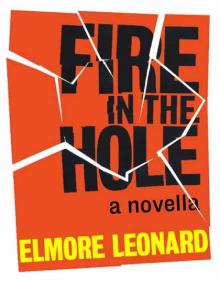 Fire in the Hole
Fire in the Hole Tishomingo Blues (2002)
Tishomingo Blues (2002)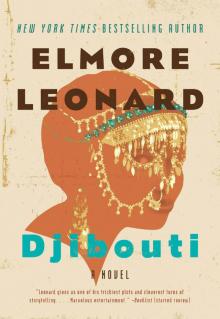 Djibouti
Djibouti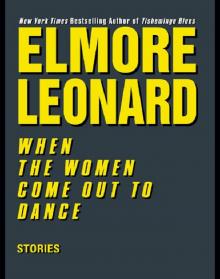 When the Women Come Out to Dance: Stories
When the Women Come Out to Dance: Stories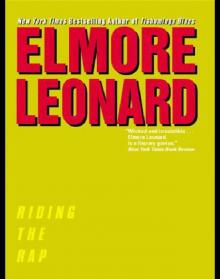 Riding the Rap
Riding the Rap Moment of Vengeance and Other Stories
Moment of Vengeance and Other Stories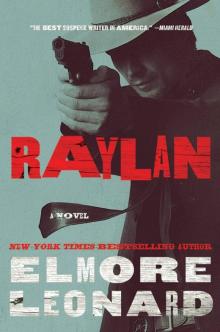 Raylan
Raylan Touch
Touch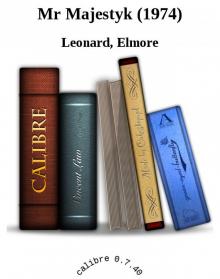 Mr Majestyk
Mr Majestyk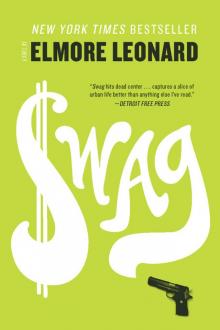 Swag
Swag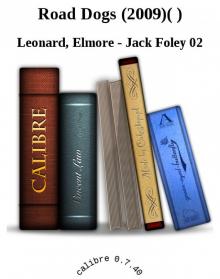 Road Dogs
Road Dogs La Brava
La Brava The Hot Kid
The Hot Kid Valdez Is Coming: A Novel
Valdez Is Coming: A Novel Be Cool
Be Cool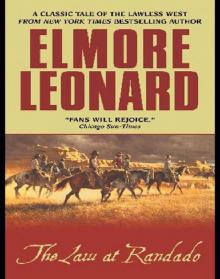 The Law at Randado
The Law at Randado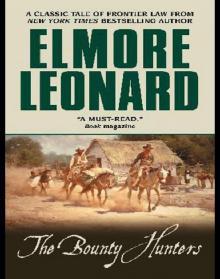 The Bounty Hunters
The Bounty Hunters When the Women Come Out to Dance
When the Women Come Out to Dance 310 to Yuma and Other Stories (1953)
310 to Yuma and Other Stories (1953)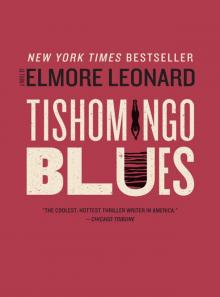 Tishomingo Blues
Tishomingo Blues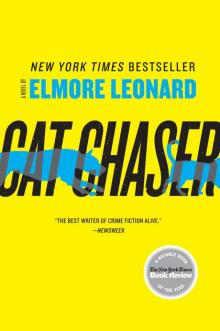 Cat Chaser
Cat Chaser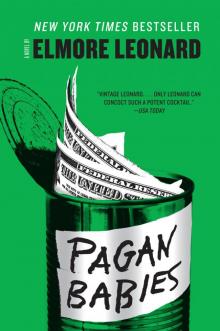 Pagan Babies
Pagan Babies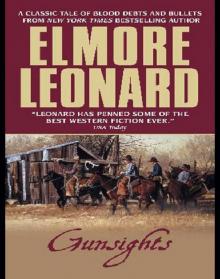 Elmore Leonard's Western Roundup #1
Elmore Leonard's Western Roundup #1 52 Pickup
52 Pickup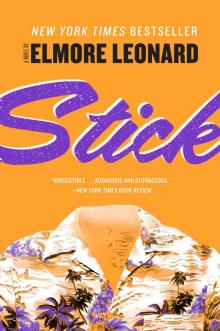 Stick
Stick The Moonshine War
The Moonshine War Valdez Is Coming
Valdez Is Coming City Primeval
City Primeval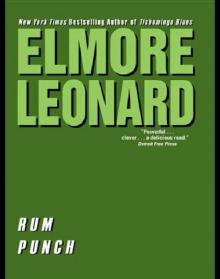 Rum Punch
Rum Punch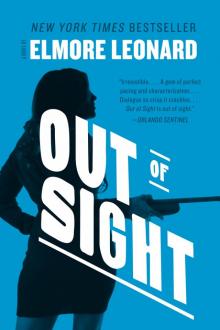 Out of Sight
Out of Sight Naked Came the Manatee (1996)
Naked Came the Manatee (1996)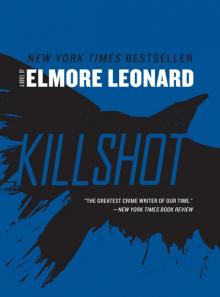 Killshot
Killshot Cuba Libre
Cuba Libre Forty Lashes Less One
Forty Lashes Less One The Complete Western Stories of Elmore Leonard
The Complete Western Stories of Elmore Leonard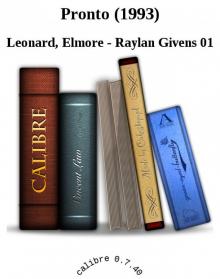 Pronto
Pronto Split Images
Split Images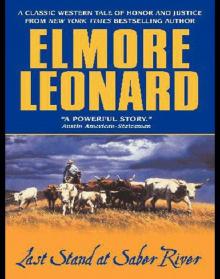 Last Stand at Saber River
Last Stand at Saber River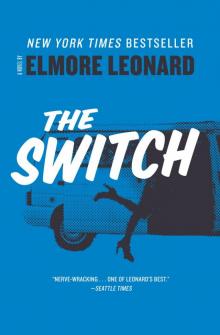 The Switch
The Switch Three-Ten to Yuma and Other Stories
Three-Ten to Yuma and Other Stories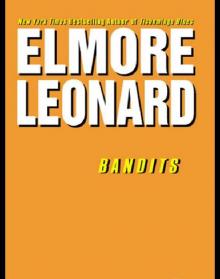 Bandits
Bandits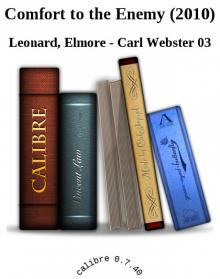 Comfort to the Enemy and Other Carl Webster Stories
Comfort to the Enemy and Other Carl Webster Stories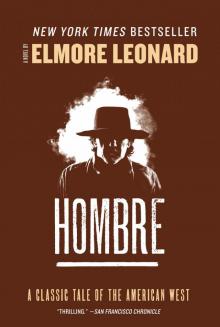 Hombre
Hombre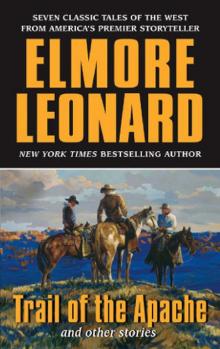 Trail of the Apache and Other Stories
Trail of the Apache and Other Stories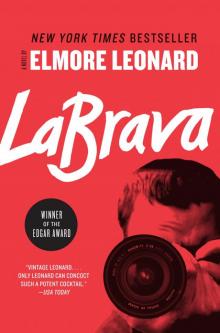 LaBrava
LaBrava Gold Coast
Gold Coast Jackie Brown
Jackie Brown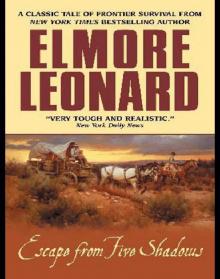 Escape From Five Shadows
Escape From Five Shadows Karen Makes out (1996)
Karen Makes out (1996)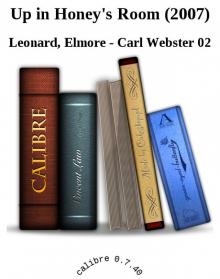 Up in Honey's Room
Up in Honey's Room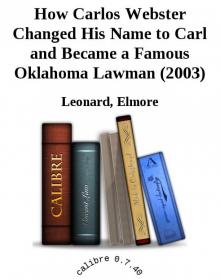 How Carlos Webster Changed His Name to Carl and Became a Famous Oklahoma Lawman (2003)
How Carlos Webster Changed His Name to Carl and Became a Famous Oklahoma Lawman (2003)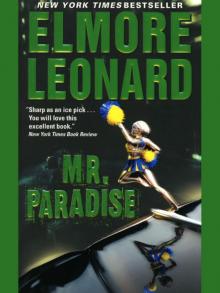 Mr. Paradise
Mr. Paradise The Hunted
The Hunted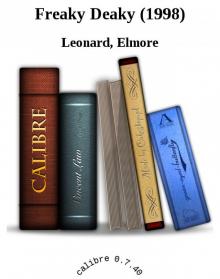 Freaky Deaky
Freaky Deaky Louly and Pretty Boy (Ss)
Louly and Pretty Boy (Ss)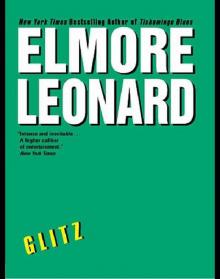 Glitz
Glitz A Coyote's in the House
A Coyote's in the House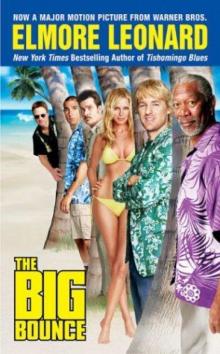 The Big Bounce jr-1
The Big Bounce jr-1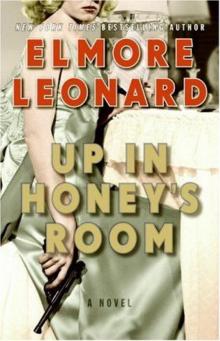 Up in Honey's Room cw-2
Up in Honey's Room cw-2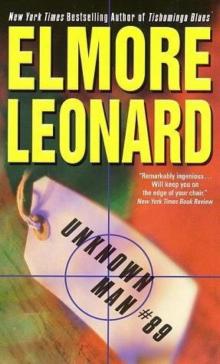 Unknown Man #89 jr-3
Unknown Man #89 jr-3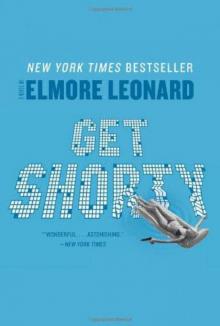 Get Shorty: A Novel cp-1
Get Shorty: A Novel cp-1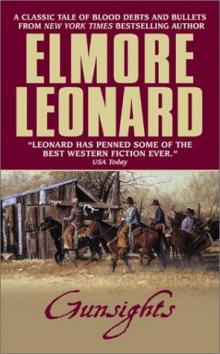 Gunsights
Gunsights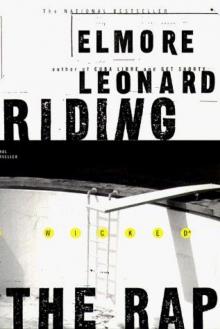 Riding the Rap rg-2
Riding the Rap rg-2